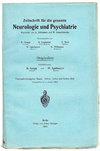Economic crisis and mental health – findings from Spain
Zeitschrift Fur Die Gesamte Neurologie Und Psychiatrie
Pub Date : 2017-04-01
DOI:10.1055/s-0038-1669559
引用次数: 8
Abstract
Summary Objective: Recent studies have begun to look at the impact of the economic crisis on mental health. This paper tries to summarize the most important findings with regard to effects of the economic crisis on mental health in Spain on the basis of a comprehensive literature review. Results: Most of the studies agree on the negative consequences on mental health of the Spanish economic crisis. A decrease in self-perceived mental health, an increase of depression and anxiety and an increase in consumption of antidepressant and anxiolytic drugs is observed during the economic crisis. The consequences of the economic crisis differ by sub-groups. Empirical Spanish studies have shown different effects of the recession on mental health depending of individuals’ socioeconomic position and educational level. Among immigrants and especially men, unemployed people and low-salary employees, the prevalence of poor mental health was higher after the economic crisis. Higher levels of education act as a protective factor against the deterioration of mental health following the economic crisis. Conclusion: The economic crisis has had negative effects on mental health in Spain, and further studies in this area could help provide useful information with a view to improving the mental health status of the Spanish population.经济危机与心理健康——来自西班牙的调查结果
摘要目的:最近的研究已经开始关注经济危机对心理健康的影响。本文试图在综合文献综述的基础上,总结有关经济危机对西班牙心理健康影响的最重要发现。结果:大多数研究都同意西班牙经济危机对心理健康的负面影响。在经济危机期间,自我感觉的心理健康状况下降,抑郁和焦虑增加,抗抑郁药和抗焦虑药的消费量增加。经济危机的后果因人群而异。西班牙的实证研究表明,经济衰退对心理健康的影响取决于个人的社会经济地位和教育水平。在移民,特别是男性、失业者和低薪雇员中,经济危机后心理健康状况不佳的普遍程度更高。较高的教育水平是防止经济危机后心理健康恶化的保护因素。结论:经济危机对西班牙的心理健康产生了负面影响,这方面的进一步研究有助于提供有用的信息,以改善西班牙人口的心理健康状况。
本文章由计算机程序翻译,如有差异,请以英文原文为准。
求助全文
约1分钟内获得全文
求助全文

 求助内容:
求助内容: 应助结果提醒方式:
应助结果提醒方式:


